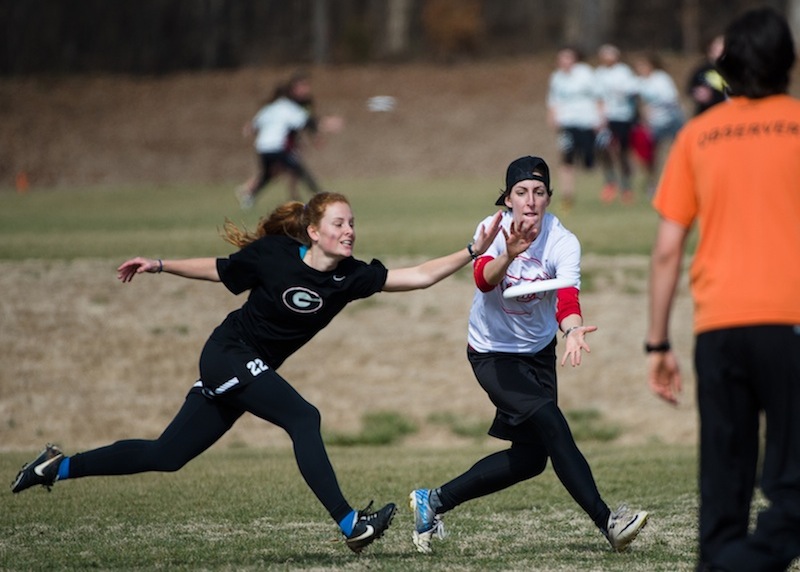 UltiPhotos.com" />
Kevin Leclaire - UltiPhotos.com
UltiPhotos.com" />
Kevin Leclaire - UltiPhotos.com
Not Enough of the Right Tournaments
I’ve had a couple conversations recently with some coaches (both men’s and women’s) who had a lot of trouble finding enough tournaments to fill their schedule. They weren’t successful and are left with a 2+ month gap that extends from their last regular season tournament in February through Conferences in April. These teams are squarely in the trying-to-earn-bids demographic — which is problematic on a couple fronts. From the standpoint of growth, any kind of glass ceiling is obviously counter productive. Growing a program is hard enough even without having to battle structural constraints. The other problem with this is the allocation of bids. These are the very teams that the algorithm needs good data about. This is purely anecdotal, so I wonder: how widespread is this problem? How many teams in that #10-30 range had trouble filling their schedules?
As I’ve been thinking about this issue I came to realize how much I like Presidents Day. It isn’t just basking in the weather or chilling above the fields at RIMAC taking it all in — it’s the competitive makeup of the tournament. You can divide most tournaments into three basic categories: regional, regional-plus and national. A tournament like Bellingham Invite or Santa Barbara Invite is regional — usually pretty small with all the teams from one or two local regions. No one is getting on a plane for this tournament. Stanford Invite or NW Challenge are national tournaments. They are typically small, intensive and very elitist in terms of team selection. Regional-plus tournaments like Prez Day or Queen City Tune Up fall into a happy medium. They are essentially regional tournaments (hence the preponderance of Southwest teams at Prez Day) with a complement of extra-regional teams in attendance. They draw a much broader range of quality than either regional or national tournaments and really do an excellent job of offering an opportunity for bubble teams to show what they’ve got. Both Texas at Prez Day and Northeastern at QCTU seized the opportunity presented to insert themselves into the national conversation.
In an ideal world, every team with Nationals aspirations would be able to find their way to one or two of these tournaments. It provides an opportunity for them to test themselves, to grow and to prove their worth. As a sport, we want these teams to get good games and a lot of them. For the algorithm and bid allocation to work, these are the teams that need a lot of games and a variety of different games.
I’m curious how widespread this issue is. If you didn’t get the schedule you hoped for, drop me an email (see below) or a comment.
~~~~~~~~~~
Masculinity and Team
A couple of my old Sockeye teammates sent this Ted Talk on Masculinity my way. Worrying about boys and masculinity isn’t really a huge part of the world I live in (I have three girls, I coach a women’s team), but it was pretty interesting with respect to the Friday Night Lights culture where I work in rural Oregon. Where it got really, really interesting for me was the last couple minutes (~11:00) of the talk. When Ehrmann started talking about team as relationships and commitments to a cause, he began speaking my language. This isn’t about men or women or masculinity, it’s about the purpose of sport. For the work we do as coaches and leaders to have any real meaning, it has to be about more than ultimate. Ultimate frisbee just isn’t that important. Here’s the weird paradox, though: for ultimate to teach anything of real meaning and importance, we have to treat ultimate as if it was of utmost importance. It is through a common cause, through the subordination of self to the team and a goal, returned back through the team’s uplifting of self that teams impart the things that really truly matter.
~~~~~~~~~~
Scrapple
- I was watching a game this past weekend at Prez Day and I overheard someone say on the line (they were losing): “We’re fighting for Nationals. We’re fighting for a bid and every point gets us closer to Nationals.” Wow.
- In conversation with a friend of mine recently about a local soccer team it came up that the coaches were very defensive and protective of their players and didn’t want anyone “trying to recruit their players.” It was a team of 8-year olds. Is this the mainstream respect we’re chasing?
-
On our way back from San Diego, we bumped into the US National Field Hockey team. I had a brief and interesting conversation with new defender Jaime Montgomery. As a member of Team USA for an Olympic sport, she’s a professional. It’s her ‘9 to 5 job.’ I was curious if the joy was still there once you were getting paid for it. “It is for me, but I just made the team…but it’s great.” Is this the mainstream respect we’re chasing?







Comments Policy: At Skyd, we value all legitimate contributions to the discussion of ultimate. However, please ensure your input is respectful. Hateful, slanderous, or disrespectful comments will be deleted. For grammatical, factual, and typographic errors, instead of leaving a comment, please e-mail our editors directly at editors [at] skydmagazine.com.